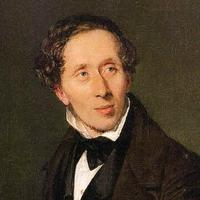The shoes of fortune, V. Metamorphosis of the Copying-Clerk, part 5
Mr. Polly uttered not a syllable in reply, but swung to and fro with dignified condescension; while a pretty canary, as yellow as gold, that had lately been brought from his sunny fragrant home, began to sing aloud.
"Noisy creature! Will you be quiet!" screamed the lady of the house, covering the cage with an embroidered white pocket handkerchief.
"Chirp, chirp!" sighed he. "That was a dreadful snowstorm"; and he sighed again, and was silent. The copying-clerk, or, as the lady said, the brown field-bird, was put into a small cage, close to the Canary, and not far from "my good Polly." The only human sounds that the Parrot could bawl out were, "Come, let us be men!" Everything else that he said was as unintelligible to everybody as the chirping of the Canary, except to the clerk, who was now a bird too: he understood his companion perfectly.
"I flew about beneath the green palms and the blossoming almond-trees," sang the Canary; "I flew around, with my brothers and sisters, over the beautiful flowers, and over the glassy lakes, where the bright water-plants nodded to me from below. There, too, I saw many splendidly-dressed paroquets, that told the drollest stories, and the wildest fairy tales without end." "Oh! those were uncouth birds," answered the Parrot. "They had no education, and talked of whatever came into their head. "If my mistress and all her friends can laugh at what I say, so may you too, I should think. It is a great fault to have no taste for what is witty or amusing--come, let us be men." "Ah, you have no remembrance of love for the charming maidens that danced beneath the outspread tents beside the bright fragrant flowers? Do you no longer remember the sweet fruits, and the cooling juice in the wild plants of our never-to-be-forgotten home?" said the former inhabitant of the Canary Isles, continuing his dithyrambic.
"Oh, yes," said the Parrot; "but I am far better off here. I am well fed, and get friendly treatment. I know I am a clever fellow; and that is all I care about. Come, let us be men. You are of a poetical nature, as it is called--I, on the contrary, possess profound knowledge and inexhaustible wit. You have genius; but clear-sighted, calm discretion does not take such lofty flights, and utter such high natural tones. For this they have covered you over--they never do the like to me; for I cost more. Besides, they are afraid of my beak; and I have always a witty answer at hand. Come, let us be men!" "O warm spicy land of my birth," sang the Canary bird; "I will sing of thy dark-green bowers, of the calm bays where the pendent boughs kiss the surface of the water; I will sing of the rejoicing of all my brothers and sisters where the cactus grows in wanton luxuriance."

